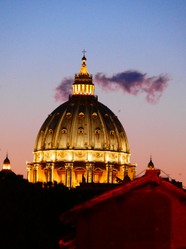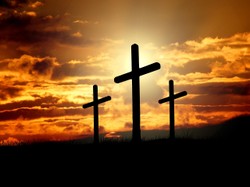One key concept in the letter that is extremely pertinent to papal thinking, but which has probably been overlooked by much of the [religiously challenged] secular press is the Pope's rejection of clericalism. When the parish priest read out the papal statement at mass this week I was delighted to hear the world's top Christian cleric damning clericalism and citing it as part of the abuse crisis, for it was one of the issues that began to concern me when I was at theological college, when I realized that some clerics were deeply into power and saw the laity and the public in general as there to be ordered around. I did not like it and have always disapproved of the use of religion or the church as a means of gaining status and power.
So what is clericalism? It is an "us and them" mentality in which the clerics regard themselves as a privileged elite. This elite demand subservience from the laity, exercise power over them and often reap the ensuing economic rewards. This power is religious in nature, but can become tied into political structures, and the blend between religious and political power is potentially toxic and destructive. We have seen the damage that has been done to the Irish church by its grave mistake of accepting De Valera's poisoned chalice of a role in the state. Clerics and politicians in cahoots with each other in comfortable networks of cronyism and mutual self-interest! Not good, destructive, and the consequences for state and church have been disastrous. Established churches are particularly vulnerable to this kind of unholy alliance, and they are places where abuse can thrive.
George Bernard Shaw once said that professions are a conspiracy against the public. I am not a great fan of Shaw, but he may have stumbled upon a significant truth, at least where some people are concerned. The clerical life, the religious ministry, must exist as a mean of service, but in the case of those infected by clericalism it takes the form of a commitment to a self-interest group in which members look after each other. We saw this in the way in which clerics covered up the abuse perpetrated by other clerics, looking after their pals while the abuse of vulnerable laity went unchecked.
Pope Francis is fiercely critical. "...When we have replace...silence..ignore...reduce the People of God to small elites we are creating communities, projects, theological approaches, spiritualities and structures without roots, without memories, without faces, without bodies and ultimately without lives." He proceeds to say that clericalism is a nullification of the baptismal grace that the Holy Spirit has placed in the soul. By this he means that by presenting themselves as the elite of Christians they are belittling the Christianity of the lay folk and ultimately laying the ground for abuse to take place. By undermining clericalism the Pope is hacking away at the rationale that underpins the networks in which abuse thrives. I regard this authoritative letter as making a long-term contribution to the Catholic theology of ministry.









 Darkness over the Earth the skies darkened when Jesus was crucified14 days ago
Darkness over the Earth the skies darkened when Jesus was crucified14 days ago
 TheThousand Year Gardenon 11/26/2025
TheThousand Year Gardenon 11/26/2025
 Women of the Gospelson 10/11/2025
Women of the Gospelson 10/11/2025
 Religious Gardenson 08/25/2025
Religious Gardenson 08/25/2025




Comments
We made o the kistakebof going into coalitions with the conservatiives,, but took the blame for their mistakes.
Your comment Sep. 1, 2018, in answer to my same-day question gets me mulling the competitiveness and non-competitiveness of new parties and of those alternative parties -- such as the Libertarian here -- that have their following.
You indicate that your centrist party is "not doing well at the moment."
Might things have changed for the better or the worse or might they have stayed more or less the same in the course of the last 6 years?
Thanks Derdriu. What you have said about Senator Kennedy is very significant.It shows the ruthless streak in many capitalists..But lest any think me a Socialist, I distrust Socialist bureaucrats and apparachiks too. I am resolutely centrist. I am a member of a small centrist party. Unfortunately, we are not doing well at the moment.
frankbeswick, Thank you for the explanations and product lines. In particular, it impressed me about the hypothetical situation of someone always underpaying workers but giving to charity. (I remember Senator Kennedy saying that every time that he managed to get a pay rise through in Congress that so many businesses then turned jobs into part-time.) It made me think of my favorite passage in Les Misérables where the bishop turns Jean Valjean's life around by letting him have the silver.
Right, an active conscience and continuous efforts should make a difference!
You have made an important point, Mira. Drawing the line is not easy, but I would say that anyone who is self-critical and who is trying to live their life according to moral standards, and who does not excuse their own wrongdoing is not corrupt. It is thus easier to say who is not corrupt than who is.
I like that comment saying that we are all sinners but we are not all corrupt. But where do you draw the line exactly? As you say, there's often self-deception at work too. I'm not talking about clerical abuse here. I'm speaking in general.
Thanks for this. We have both many years in the Catholic Church behind us and the fact that we know so few abusers "speaks oceans." I suggest that the problem occurs in patches, in areas where supervision of entrants to the priesthood is lax and so unsuitable candidates can survive and where it is possible for people to slip into the ministry for the wrong reasons.
Frank, I have known many priests, and none were involved in anything like this. I taught at a secondary school seminary, and heard of nothing.
The Catholic Herald some years ago released figures that said that the percentage of abusers among priests was lower than the percentage in the population at large, but statistics are notoriously fickle. I was baptized a Catholic sixty eight years ago, went to theological college and worked for a while in Catholic education, and I have only known five priestly abusers. Other priests had their faults, such as drinking too much, but abuse was not among them.